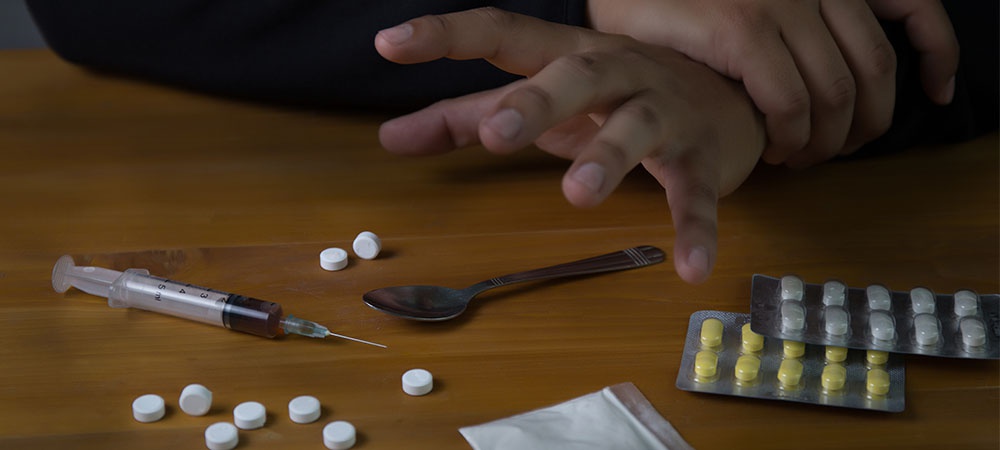People are always quick to point out the side effects of drug abuse. Several posts go on and on about the dangers accompanying continuous indiscriminate drug consumption. Eventually, they suggest some recovery regime or detox process as the way out. However, very few care to discuss these detox treatments in detail. Even fewer ever explain the mental and physical withdrawal symptoms that occur during the recovery phase.
We don’t refute claims that substance dependence disorder is a dangerous condition. In fact, we agree that constantly dosing up on narcotics is extremely risky both to your physical health and your sanity. So, we also recommend you get help as soon as possible. Signing up for addiction treatment may eventually be the best decision you’ll make for yourself.
In addition, we understand that the journey to recovery is never an easy one. It’s a steep climb up a path strewn with debris, jagged rocks and loose soil. So, you can get tired, slip off debris, lose your footing or get injured as you attempt to move forward. So, to help you prepare adequately for the arduous journey ahead, we’ll be discussing everything that withdrawal entails. We’ll also examine some of the symptoms you might experience during this phase.
What is a Withdrawal Phase?
The withdrawal phase is a period during drug addiction recovery where the recovering addict experiences several symptoms. The symptoms are generally unpleasant conditions that occur due to abruptly stopping the substance use.
Withdrawal happens as a result of dependence on the substance. So, when you suddenly quit using the drug, withdrawal is your body’s way of protesting and demanding you continue using it. Unfortunately, the demands don’t stop in a day. You’ll keep experiencing them for a while until your body eventually learns to function without narcotics again.
Over the cause of your addiction and indiscriminate drug use, your body and mind will develop a dependence on narcotics. This condition will gradually render you unable to function efficiently without the substance. So, when you attempt to quit or can’t get your regular dose of narcotics, your body and mind find it difficult to cope.
Essentially, the withdrawal phase features physical, mental, financial and social effects. These experiences are typically negative, unpleasant and potentially dangerous in extreme cases. Plus, the severity and duration of these withdrawal symptoms are usually proportional to the individual’s level of dependence. So, you should prepare to go through a thoroughly unpalatable phase.
The withdrawal phase mainly affects two aspects of your being. First, it affects your physiology, i.e. body. We’ll refer to this as the physical withdrawal effects. It also affects your psychology, i.e. state of mind. We’ll refer to this as mental withdrawal from drugs. Let’s examine the two types of withdrawal effects in more detail.

Physical Withdrawal From Drugs
Most people classify the physical and mental withdrawal symptoms as types or two different forms of drug withdrawal experience. However, in actuality, they’re more like phases that occur one after the other. And, of course, physical withdrawal always comes first. Hence, it’s the most commonly depicted aspect of the withdrawal phase.
The physical withdrawal phase accompanies the detoxification period. Detoxification is a process through which your body gets rid of the remnants of the drugs from its system. The symptoms are not necessarily a result of your body flushing out the toxins. Instead, they occur because your body has become accustomed to the toxins, and it feels uncomfortable when they’re absent.
What is Physical Withdrawal?
Everything that happens during the early stages of the withdrawal phase, which causes you any form of body pain, is a symptom of physical withdrawal. That’s aside from external injury and most sicknesses.
The onset time of the physical withdrawal phase depends primarily on your level of addiction to the substance. For example, if you have a severe addiction to opioids, you may start experiencing the withdrawal symptoms within 12 hours after your last consumption.
The opiate withdrawal symptom typically starts with a headache which quickly progresses to uncontrollable shivering. Within a few hours, you may start sweating profusely while experiencing anxiety attacks.
As the phase progresses, you’ll go through bouts of agitation, muscle aches, vomiting, cramps, intense opioid cravings, physical pain, nausea and even diarrhea. In severe cases, it may cause you to hallucinate or pass out.
Opiate physical withdrawal can last between 3 to 14 days, depending on how badly you’ve riddled your body with the substance. You may only experience the withdrawal symptoms for a couple of days if you have mild to moderate addiction. However, if your level of dependence is high, your detox and physical withdrawal period may take weeks or even a month.
On the other hand, cocaine physical and mental withdrawal occurs as soon as the remnants of the last dose leave your body. However, the withdrawal symptoms only last for a short length of time. People refer to the period of cocaine withdrawal as a “cocaine crash.” Generally, you may experience anxiety, fatigue, restlessness, itching, confusion, hallucinations, depression, irritability, and intense cocaine cravings during this period. Fatality or emergency health situations may also occur in extreme cases.
Physical withdrawal symptoms are not in any way palatable. They’re often excruciating when they appear. Plus, they’ll leave you in extreme agony and negativity.
Fortunately, several medical processes can help make the physical and sometimes mental withdrawal phase more bearable. Doctors recommend medications and therapies for mitigating symptoms of physical withdrawal from drugs. So you can take harmless/less-harmful drugs to help you get over the effects of a very harmful drug.
It’s always best to sign up for a medical detox program instead of going the cold-turkey route. Cold turkey detoxification is trying to abruptly quit narcotic substances without medical help or supervision. Unfortunately, you’ll most likely not last long before relapsing.

Mental Withdrawal From Drugs
The unique thing about substance dependence disorder is its two-faced nature. I.e. you have to go through both a physical and a mental withdrawal/recovery phase before you can get clean.
However, while physical withdrawal is the first and most intense phase of the recovery, the psychological is the longest. To put it simply, the mental withdrawal phase is a battle of attrition between your will and desires. It’s a struggle in your mind as you seek to maintain your stance on never indulging in your self-deprecating habits again.
The physical withdrawal typically lasts for days or weeks – a few months in extreme cases. However, the mental withdrawal phase can last several months or even years. The biggest problem with psychological withdrawal is that it’s a complex notion with a very tricky nature.
For example, several addiction experts believe that behavioural and psychological effects hold the primary influence on addiction. Physical withdrawal symptoms occur because the body is accustomed to being fuelled by narcotic substances. However, it’s very different from mental withdrawal. In fact, you can experience psychological withdrawal from a drug even though you’re not physically dependent on it.
An excellent way to describe mental withdrawal is holding to a belief that you need the drug to function. Your body isn’t demanding it; however, your mind believes you require the item to feel alright. This situation may be because the brain has come to associate the times the body feels good to coincide with when you use the drugs. Hence, it believes that drugs equal happiness or satisfaction.
It takes a while to overwrite such conditions. Also, damage to brain cells caused by drugs may further complicate the psychological withdrawal process. It may lead to significant changes in cognitive and behavioural tendencies. Mental side effects of drug withdrawal are often visible in behavioural changes.
You can often notice mental withdrawal symptoms in how people interact with others around them. Some of the common signs of psychological withdrawal include:
- Anxiety
- Emotional instability and paranoia
- Social withdrawal
- Irritability, anger and volatility
- Self-esteem issue
- Delusions, hallucinations and depression
- Difficulty thinking straight/processing information
- Difficulty maintaining concentration
- Inability to perform cognitive tasks
- Memory loss
- Cravings for narcotic items
- Inability to enjoy otherwise pleasurable activities.
What makes mental withdrawal especially difficult is that anything and everything can trigger it. Plus, you don’t need to be physically addicted to the drug to experience psychological withdrawal. So, the symptoms can occur regardless of whether you only took the drugs once or consumed a bucketload of them.
It becomes even more difficult if you rely on the drug as a coping mechanism. A severe wave of mental withdrawal will set in whenever you find yourself in situations that stress you.
Note that damages done to the brain by the drug aren’t symptoms of psychological withdrawal. Instead, they’re more like the negative consequences of drug abuse, which may facilitate psychological withdrawal symptoms.

Treatment for Psychological Withdrawal
The best and most natural cure for physical and mental withdrawal is time. Time heals everything, they say. So, the best and most thorough treatment you can get for this phase is the one time affords your body to give to itself. The temptation and mental trials get easier with time until they eventually fade out from your consciousness.
However, given how challenging the mental withdrawal phase can be, doctors have devised treatment regimes to make it more bearable. The treatments vary as different therapists have unique approaches to tackling the problem. However, we’ll discuss the popular treatment strategies that almost all addiction specialists use.

Tackle the Underlying Problem Through Cognitive Behavioral Therapy
The first approach many caregivers take in tackling mental withdrawal is to look for underlying problems responsible for the addiction. Often, a challenge may be the trigger that’ll cause the onset of the withdrawal phase.
For example, someone with insecurities and anxiety problems may have used drugs to feel better in the past. However, they no longer want to rely on medications to cover their emotional issues during the recovery phase. But that doesn’t mean they will stop having anxiety attacks. And when they do, it often triggers a craving for the substance.
Studies have shown that removing the underlying condition may be sufficient to manage an addiction problem. The biggest one yet was the research done by the psychiatric researcher Lee Robins on soldiers returning from Vietnam after the cold war. She discovered that 90% of the soldiers got over their addiction without much help within a year after returning from the frontlines.
She discovered that the soldiers only used the drug as a coping mechanism for the traumas of the war. And removing the unpleasant experiences was enough to take care of the addiction.
Hence, many therapists attempt to tackle mental withdrawal by eliminating the underlying problem.
Motivational Interviewing
Doctors typically employ this mode of treatment for people who are experiencing withdrawal due to self-worth issues. The emotional rollercoaster you have subjected your mind to during your addiction phase may result in self-esteem issues. It may lead to feelings of inadequacy when you quit the substance. So, doctors use motivational interviews to reassure you of your self-worth and help you get over your withdrawal phase.
Self-Help Groups
While joining self-help groups isn’t exactly a treatment regime, it’ll help you get things off your mind. Sometimes, simply talking things out helps us to feel better. In addition, self-help groups usually comprise individuals with the same issues as you. So, it’s easier to pour out your mind without fear of them judging you.
Related Article: Drug Detox: Process, Side Effects
Final Thoughts
Physical and mental withdrawals are the main factors that cause addicts to relapse. If you don’t prepare your mind and body adequately for these phases, you may have it rough when it starts. The best way to prepare is to sign up for professional addiction treatment.
Here at Medical Detox Ontario, we offer a rigorous medical detox program that caters to all your physical and medical needs. Call us today to discuss addiction treatment options.

